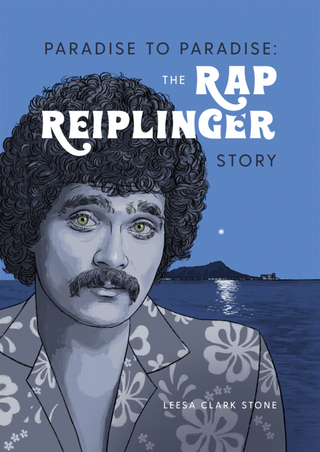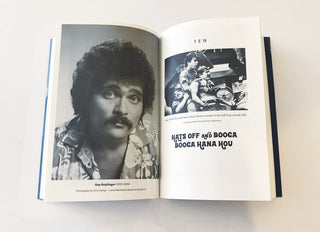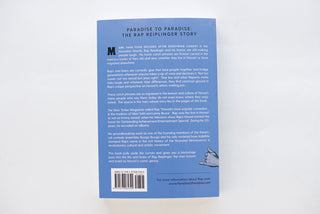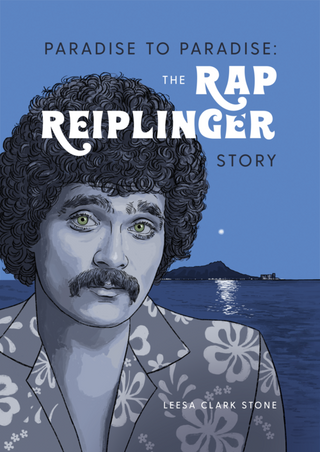More than 4 decades after redefining comedy in the Hawaiian Islands, Rap Reiplinger and his humor are still making people laugh. His iconic catch phrases are forever carved in the memory banks of fans old and new, whether they live in Hawai‘i or have migrated elsewhere.
Rap’s one-liners are comedic glue that bind people together and bridge generations whenever anyone takes a sip of wine and declares it, “Not too sweet, not too rancid, but jesss right!” That line and other “Rapisms” make folks laugh, and, whatever their differences, they find common ground in Rap’s unique perspective on Hawai‘i’s ethnic melting pot.
These catch phrases are so ingrained in the lexicon and culture of Hawai‘i that many people who say them today do not even know where they originated. The source is the man whose story lies in the pages of this book.
The New Yorker Magazine called Rap, “Hawaii’s most popular comedian. . . in the tradition of Mort Sahl and Lenny Bruce.” Rap was the first in Hawai‘i to win an Emmy award, when his television show, Rap’s Hawaii earned the honor for Outstanding Achievement/Entertainment Special.
His groundbreaking work as one of the founding members of the theatrical comedy ensemble Booga Booga, and his solo material have indelibly stamped Rap’s name in the rich history of the Hawaiian Renaissance, a revolutionary cultural and artistic movement.
This book pulls aside the curtain and gives you a backstage pass into the life and times of Rap Reiplinger, the man known and loved ad Hawai‘i’s comic genius.
ABOUT THE AUTHOR:
Leesa Clark Stone is a journalist who previously worked at Honolulu ABC affiliate KITV. She is the widow of Rap Reiplinger and, through this book, provides an intimate look inside the life of one of Hawaiʻi’s best-loved entertainers. She combines her memories and insight with those of people who knew and were close to Rap. The result is a book full of never-heard-before anecdotes and stories that will make readers laugh, maybe cry, and, in the end, come away with a greater understanding of the complex man behind the laughs.
More than 4 decades after redefining comedy in the Hawaiian Islands, Rap Reiplinger and his humor are still making people laugh. His iconic catch phrases are forever carved in the memory banks of fans old and new, whether they live in Hawai‘i or have migrated elsewhere.
Rap’s one-liners are comedic glue that bind people together and bridge generations whenever anyone takes a sip of wine and declares it, “Not too sweet, not too rancid, but jesss right!” That line and other “Rapisms” make folks laugh, and, whatever their differences, they find common ground in Rap’s unique perspective on Hawai‘i’s ethnic melting pot.
These catch phrases are so ingrained in the lexicon and culture of Hawai‘i that many people who say them today do not even know where they originated. The source is the man whose story lies in the pages of this book.
The New Yorker Magazine called Rap, “Hawaii’s most popular comedian. . . in the tradition of Mort Sahl and Lenny Bruce.” Rap was the first in Hawai‘i to win an Emmy award, when his television show, Rap’s Hawaii earned the honor for Outstanding Achievement/Entertainment Special.
His groundbreaking work as one of the founding members of the theatrical comedy ensemble Booga Booga, and his solo material have indelibly stamped Rap’s name in the rich history of the Hawaiian Renaissance, a revolutionary cultural and artistic movement.
This book pulls aside the curtain and gives you a backstage pass into the life and times of Rap Reiplinger, the man known and loved ad Hawai‘i’s comic genius.
ABOUT THE AUTHOR:
Leesa Clark Stone is a journalist who previously worked at Honolulu ABC affiliate KITV. She is the widow of Rap Reiplinger and, through this book, provides an intimate look inside the life of one of Hawaiʻi’s best-loved entertainers. She combines her memories and insight with those of people who knew and were close to Rap. The result is a book full of never-heard-before anecdotes and stories that will make readers laugh, maybe cry, and, in the end, come away with a greater understanding of the complex man behind the laughs.
Questions?






